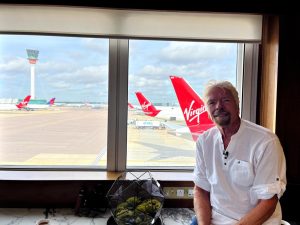Billionaire businessman Richard Branson has declined an invitation from Singapore’s government to take part in a live televised debate on the country’s use of the death penalty. The invitation was extended by Home Affairs and Law Minister K. Shanmugam last month after Branson penned a blog post in which he said that Singapore’s use of capital punishment put it “on the wrong side of history.”
In a statement posted on the website of his company Virgin yesterday, the British entrepreneur said that he had “enormous respect” for Singapore and it was because of this that he feels “compelled to speak out” when he sees things “go as horribly wrong as Singapore’s use of the death penalty.”
But he said the proposed debate would not provide edifying or illuminating. “A television debate – limited in time and scope, always at risk of prioritizing personalities over issues – cannot do the complexity of the death penalty any service,” he wrote. “What Singapore really needs is a constructive, lasting dialogue involving multiple stakeholders, and a true commitment to transparency and evidence.”
In recent months, the 72-year-old businessman, a long-time anti-death penalty campaigner, has criticized Singapore’s harsh drug policies, including its use of capital punishment in certain drug cases.
Branson was particularly outspoken in the case of Nagaenthran K. Dharmalingam, who was executed in April of this year, despite the claims of his family and legal representatives that he had an intellectual disability.
In an interview with AFP conducted in Nagaenthran’s final days, Branson described Singapore’s continued use of the death penalty in drug cases as a “horrible blotch” on the city-state’s reputation. He urged Singapore to “abolish the death penalty altogether” and “do what most other civilized countries have done.”
“I don’t think civilized countries should be in the business of killing their people, or killing anybody,” he said.
Branson’s statement was issued just three days after another man was sentenced to death for the possession of 34.94 grams of heroin. The judge had little choice, given that Singaporean law mandates such a sentence for anyone convicted of trafficking more than 15 grams of the drug.
Branson was probably wise not to engage in a debate with Shanmugam. In issuing its invitation, the Singaporean Ministry of Home Affairs said that it “did not accept that Mr Branson or others in the West are entitled to impose their values on other societies.” This suggests that Shanmugam would have attempted to frame the issue in terms of the “Asian values” debate that raged in the 1990s, generating a good deal more heat than light. As Kirsten Han, a longtime Singaporean anti-death penalty advocate argued in a recent newsletter, the debate was intended as “political theater and not about good faith engagement on the issues of capital punishment and drug policy.”
Indeed, another reason that Branson chose not to take part is that he had no wish to drown out the local voices that have spoken out against Singapore’s use of the death penalty, citing the Transformative Justice Collective and the Singaporean lawyers who have represented death row clients as examples.
“The brave thing for you would be to actively engage those Singaporean stakeholders… and treat them as equals who are just as interested in Singapore’s progress as I’m sure you are,” he wrote. “They deserve to be listened to, not ignored, or worse yet, harassed.”
































